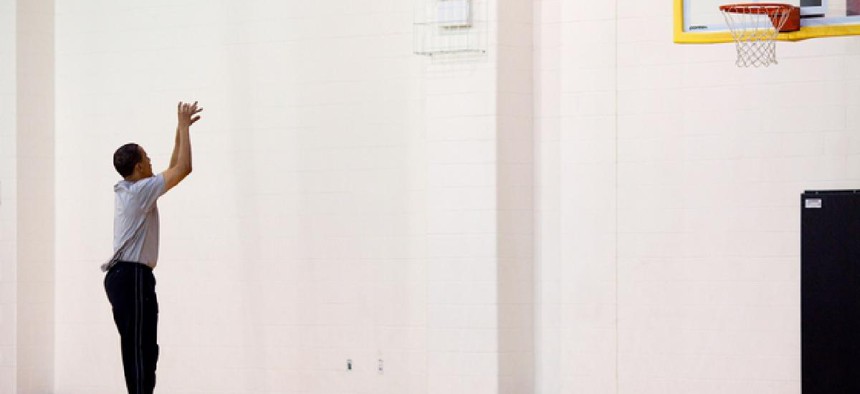
White House Flickr Stream
Exercising Leadership: A Re-elected Obama’s Mental & Emotional Fitness
Four tools from President Obama to improve your mindset and allow you to lead at your best.
Although referring to the game of golf, Bobby Jones could easily have been referring to the practice of leadership when he said, “Competitive golf is played mainly on a five-and-a-half-inch course—the space between your ears.” In other words, our psychology (or mindset) significantly influences our performance. This view is supported by scientific research and illustrated by Michael Lewis’ Vanity Fair profile of Barack Obama. Four tools that improve Obama’s mindset and allow him to lead at his best are described below.
Routinizing Trivial Decisions
The concept of decision fatigue received substantial attention with the release of Willpower: Rediscovering the Greatest Human Strength by Dr. Roy Baumeister and John Tierney. The energy used to make decisions depletes with each decision that’s made. Recognizing this point, President Obama has created systems to routinize many mundane tasks that would otherwise sap his mental energy. He says,
You’ll see I wear only gray or blue suits. I’m trying to pare down decisions. I don’t want to make decisions about what I’m eating or wearing. Because I have too many other decisions to make. You need to focus your decision-making energy. You need to routinize yourself. You can’t be going through the day distracted by trivia.
Tip
Like President Obama, we can all create systems that routinize distracting tasks and reserve energy for more important decisions.
Emotional Fitness
Emotional fitness is a term used in psychology that speaks to the ability to quickly adapt to a desired emotional state. Just like an athlete mentally preparing for a race, a leader can mentally prepare to motivate employees, lighten a tense situation, or solve a complicated problem. Few people display the power of emotional fitness better than President Obama, who, over the course of just one emotion-laden day that Michael Lewis describes, needed to tap into empathetic, joyful, and creative mental states. Among other commitments, Obama consoled a child suffering from an incurable disease, celebrated the winners of an Intel high school competition, and strategized with 18 advisors on how to kill Osama Bin Laden.
Tip
Some techniques used to strengthen emotional fitness include: interrupting the pattern of the emotion by asking questions that identify what you're feeling, what you want to feel, what you'd have to believe to feel the way you did; remembering how you've successfully handled a similar emotion in the past and applying that to the situation at hand.
Inquiry
Engaging in inquiry, which is the process of seeking knowledge through questions, can lead to more informed views and creative solutions. As Michael Lewis describes, when the Pentagon presents the President with two options for how to address an international crisis, Obama masterfully crafts his questions to reveal that neither option would solve the problem. From there, the President goes on to question every person in the room, including the most junior level people, to get a more nuanced view and strategy.
Tip
Rather than blindly advocating one view or accepting another, ask questions that reveal the assumptions behind a proposal, the data supporting those assumptions, and any gaps in the reasoning. For further reading on the use of inquiry as it applies to organizations and leadership, Peter Senge’s, The Fifth Discipline: The Art & Practice of the Learning Organization is a good place to start.
Body Movement
Research has demonstrated that our physical state can influence our mindset and performance. While there is plenty of evidence linking exercise to wellbeing and performance, less well known is the impact of body language on these outcomes. Amy Cuddy of Harvard Business School helps surface the significance of body language with studies examining its effects on job interview performance. Here’s her TED talk. Although Obama has not articulated a link between how he carries himself and his effectiveness as a leader, he has emphasized the role of exercise, from daily workouts at the gym to regular basketball games, in allowing him to do his job effectively. As he says, “You have to exercise or at some point you’ll just break down.”
Tip
Share Your Thoughts
NEXT STORY: Capitol Christmas tree en route to Washington







